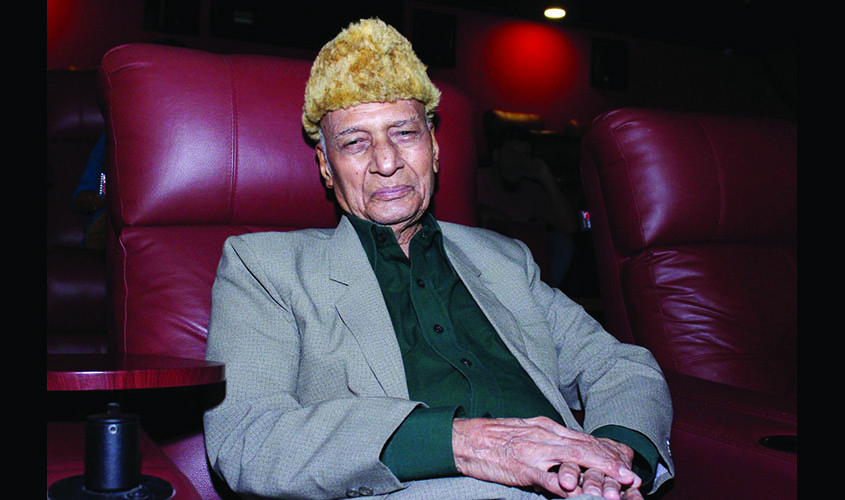Music director and film score composer Khayyam—whose work stood out among notable names in the film industry like S.D. Burman, Naushad, Shankar Jaikishen, Laxmi Kant-Pyare Lal, Madan Mohan, O.P. Nayyar, Kalyanji-Anandji, R.D. Burman and many others—breathed his last on Monday, 19 August, in Mumbai at the age of 92. His death occured due to a cardiac arrest in a hospital where his singer wife, Jagjit Kaur, was also convalescing in an adjoining room.
Born Mohammad Zahoor Khayyam Hashmi, in Rahon, Nawanshahr, Punjab, on 18 February 1927, Khayyam’s heart was never in his studies and always yearned for music. As a child he ran away from his home and came to Delhi to one of his uncles, who, seeing his keen interest in music, arranged for him to be trained under the classical vocalist and composer Pandit Amar Nath.
At the age of 17 Khayyam went to Lahore looking for work in the film industry as an actor, but ended up becoming an assistant of Baba Chishti, a famous Punjabi music director. After that, he joined the army during the First World War, in the hope that the British would free India as a reward for the solidarity Indians had shown them.
After his short stint in the army, Khayyam moved to Bombay to build a career for himself in the film industry.
A creator of unforgettable melodies, Khayyam started his career in 1948 by teaming up with his co-composer Rahman Verma; the duo came to be known as Sharmaji-Vermaji. They made their debut with Heer-Ranjha.
After Rahman Verma migrated to Pakistan due to Partition, Khayyam’s solo career started with one of his earliest breaks in 1950, with the film Biwi. One song from this film, “Akele Mein Woh Ghabrate Toh Honge”, became an instant hit.
Footpath (1953), a Dilip Kumar-Meena Kumari-starrer, which included the ballad “Sham-e-Gham Ki Qasam”, gave Khayyam further success. Then, with Raj Kapoor’s and Meena Kumari’s film Phir Subha Hogi (1958) began his association with Sahir Ludhianvi. Songs like “Chin-o-Arab Hamara”, “Woh Subha Kabhi Toh Aayegi”, “Aasman Pe Hai Khuda Aur Zameen Pe Ham” established him as a sought-after music director. Songs penned by Kaifi Aazmi for Shola Aur Shabnam (1961), Aakhri Khat (1966) became huge hits. Aakhri Khat’s song “Baharo Mera Jeewan Bhi Sanwaro” became very popular and topped the charts.
Film songs based on Indian classical and folk music were always the first choice of the early stalwarts of the Indian film music industry. Master instrumentalists who were part of film orchestras contributed in making melodies that were acclaimed for their superb artistry.
Ragas such as Khamaaj, Pilu, Asawari, Bilawal, Kalyan, Kafi, Pahadi and many others were used in making excellent classical and semi-classical songs. Many styles and variations from Hindustani and Carnatic treasures made these creations popular among people. A lot of Khayyam’s songs fall in the same class. Pahadi was his favourite raga. He used the ghazal style masterfully. Khayyam and Madan Mohan, another stalwart of the film music industry, gave ghazals to Indian films which can be cited as masterpieces.
Khayyam’s work from the 1970s and early ’80s established his reputation. Songs from films like Khandaan (1965), Noorie (1979), Trishul (1978), Thodi Si Bewafai (1980), Bazaar (1982) and Raziya Sultan (1983) became huge hits and remain unforgettable.
Khayyam gave memorable musical scores in Kabhie Kabhie (1976) and Umrao Jaan (1981) for which he will be remembered as an all-time great. The lyrics written by Sahir Ludhianvi for Kabhie Kabhie and by Shahryaar for Umrao Jaan can be counted among the most commendable, poetic works in the history of Indian cinema.
“Is Anjuman Mein Aap Ko Aana Hai Baar Baar, Deewaar-o-Dar Ko Ghaur Se Pehechaan Leejiye, Dil Cheez Kya Hai.” When audiences saw the beautiful Rekha dressed in attractive traditional attire sing these lines, it became difficult for them to separate poetry, literature and music from each other. At such times one is unable to fathom whether it was the poet who brought the best out of a song or the composer who brought it to life. Khayyam had a poet deep within him who understood and felt poetry to the depth of his soul. He used to literally “live” the lyrics used by him for his songs and scored music only after understanding how and where it will be used and who will enliven them on the screen. The lyrics always stood out in his work.
Khayyam and Jagjit Kaur’s marriage in 1954 was one of the first inter-communal marriages in the Indian film industry. Kaur herself is a very accomplished and melodious singer with a unique voice. Her voice and Khayyam’s music created magic in whichever song they produced together. A song from the film Shagun (1964), “Tum Apna Ranj-o-Gham Apni Pareshani Mujhe De Do”, is an all time favourite among lovers of film music.
Khayyam won three Filmfare Awards: for best music Kabhie Kabhie in 1977, for Umrao Jaan in 1982, and a lifetime achievement award in 2010. He got the Sangeet Natak Akademi Award in 2007. He was awarded India’s third highest civilian honour, the Padma Bhushan, in 2011.
In 2016, Khayyam and his wife created a charitable trust and donated their entire wealth and savings to promote and support emerging artists and technicians. Khayyam will live on and will be remembered with great admiration and respect for his valuable contribution to music and to humanity.

